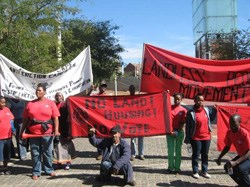






At the same time, a growing rift between the public and private sectors is cited as the main reason why so little headway is being made on these issues, which are the country's biggest challenges.
If there is no change in the status quo, analysts warn SA may slide into a quagmire of social and economic instability - a scenario which appears to have begun, with a growing wave of service delivery protests across the country.
"One of the fundamental problems of SA is that you have a separation between the people who hold political power and the people who hold economic power," says political economist Moeletsi Mbeki. "The holders of economic power feel very insecure because they have no political power and the only way they can protect themselves is to keep money in the bank rather than investing. If there was a more unified ruling class in SA you would have more certainty."
The contribution of the private sector to overall fixed investment in SA has slid to 61% from 75% between 2000 and 2007, according to data compiled by Luke Doig, senior economist at Credit Guarantee Insurance Corporation. Data from the Reserve Bank show that investment by both the public and private sector has fallen to 19% of gross domestic product from more than 24% late in 2008.
Private companies are said to be sitting on a cash stockpile of more than R520bn, reflecting their reluctance to fund new projects.
Economists and businessmen have frequently blamed talk of nationalisation and lack of policy clarity for waning business confidence in SA, both among domestic and international companies.
But Econometrix analyst Azar Jammine thinks these debates are symptoms, rather than causes, of the lack of trust between the public and private sectors.
"In a nutshell, people don't have confidence that we will be able to resolve our unemployment, inequality and poverty problems. They don't see enough cohesion between the private sector and the government to address these issues in a unified manner," he says.
"Their conclusion is that economic growth won't be sufficient to address the problems on their own and you will have continuing escalation of inequality leading to social and political instability - which is not conducive to investment in the longer term."
SA is one of the most unequal countries in the world, with the top 10% of the population accounting for 58% of its income and the bottom half less than 8%, the World Bank said in a report last month.
Mbeki says the fundamental hurdle to equality in SA is the creation and funding of a new administrative class which is "sucking resources" from the productive sector of the economy and diverting them to consumption.
The new political elite is "constantly threatening to milk economic assets through taxation, corruption, confiscation and nationalisation", he says.
It is also "driving the extravagant lifestyles which at the end of the day were at the expense of investment and job creation".
Jammine says the biggest obstacle to tackling SA's ingrained social issues is the poor quality of general education and skills, which is interpreted by foreign investors as a sign that the country will make little progress in addressing inequality and unemployment.
SA's jobs statistics tell a grim story. In addition to the 4.5-million people who are officially unemployed, there are 2.3-million "discouraged" job seekers who have given up looking for work, and another 12.68-million classified as "not economically active".
That adds up to 19.46-million people who lack jobs, compared with the 17.9-million people who are employed.
Of the officially unemployed, about 60% do not have a matric qualification, 68% have been looking for work for a year or longer, and 43% have never worked.
Mbeki predicts that the growing numbers of university graduates who cannot find jobs in SA will sooner or later provide an "explosive cocktail" which will articulate the discontent of the country's poor majority.
"Young people won't see the issues of apartheid as the cause of their problems, they will see the ANC (African National Congress) as the cause of their problems.
"It's already starting to happen," he says.
SA experienced the highest number of protests since 2004 in the first seven months of this year, according to Municipal IQ, a web-based data and intelligence service. Nearly 90% of the protests last month were violent.
In terms of SA's history, the trigger for a mass social uprising would likely be police brutality, says Mbeki. "It's like a Greek tragedy - you know it's going to happen and everyone in the drama knows it's going to happen but they can't stop themselves," he says.
Source: Business Day via I-Net Bridge

For more than two decades, I-Net Bridge has been one of South Africa’s preferred electronic providers of innovative solutions, data of the highest calibre, reliable platforms and excellent supporting systems. Our products include workstations, web applications and data feeds packaged with in-depth news and powerful analytical tools empowering clients to make meaningful decisions.
We pride ourselves on our wide variety of in-house skills, encompassing multiple platforms and applications. These skills enable us to not only function as a first class facility, but also design, implement and support all our client needs at a level that confirms I-Net Bridge a leader in its field.
Go to: http://www.inet.co.za